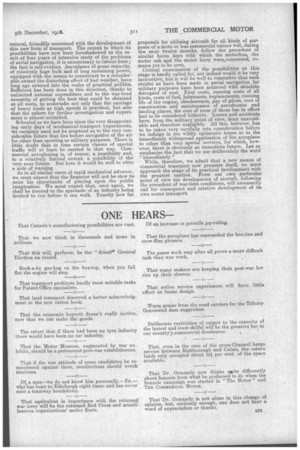ONE HEARS
Page 3

If you've noticed an error in this article please click here to report it so we can fix it.
That Canada's manufacturing possibilities are vast. Thal, we now think in thousands and muse in That this will, perforce, be the "driest General Election on record.
Rock-a-by gas-bag on the bus-top, when you fall flat the engine will stop.
That transport problems hardly seem suitable tasks for Patent Office specialists.
That land transport deserved a better acknowledgment in the new ration book.
That the economic boycott doesn't really matter, now that we can make the goods.
The retort that if there had been no tyre industry there would have been no car industry.
That the Motor Museum, augmented by war exhibits, should be a petmanent post-war establishment.
That if the war attitude of some candidates be remembered against them, recollections should wreck elections.
Ot a man—we do not know him personally.—En.— who'has been to Edinburgh eight times and has never seen a tramway breakdown.
That equivalent in importance with the returned war lorry will be the returned Red Cross and miscellaneous organizations' motor fleets. Of an increase in juvenile soy-riding.
That the aeroplane has superseded the bee-line and crow-flies phrases.
The peace work may after all prove a more difficult task than war work.
That many makers are keeping their post-war lorries up their sleeves.
That, active service experiences will have little effect on frame design.
Warm praise from the road carriers for the Tilb cryGravesend dam suggestion.
Deliberate restriction of output to the capacity of the laziest and least skilful will be the greatest bar to our country's commercial dominance. •
That, even in the case of the cross-Channel barge service between Richborough and Calais, the return loads only occupied about 12,i per cent, of the space available.
That Dr. Ormandy now thinks quite differently about benzole from what he professed to do when the benzole campaign was started in "The Motor" and THE COMMERCIAL MOTOR.
That Dr. Ormandy is not alone in this change ot opinion, but, curiously enough, one does not hear a word of appreciation or thanks.






















